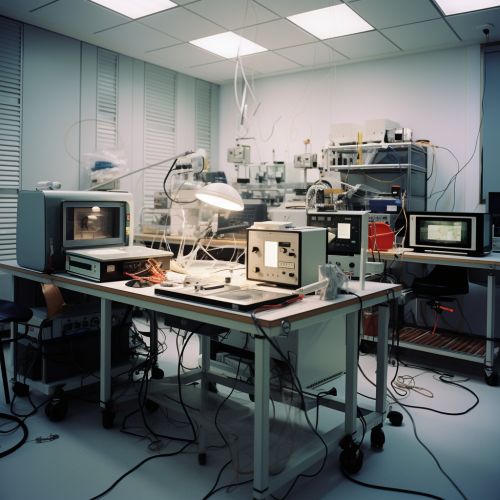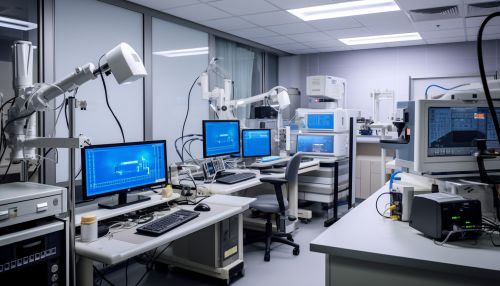Electrophysiology
Overview
Electrophysiology is the branch of physiology that studies the electrical properties of biological cells and tissues. It involves measurements of voltage changes or electrical current or manipulations on a wide variety of scales from single ion channel proteins to whole organs like the heart. In neuroscience, it includes measurements of the electrical activity of neurons, and particularly action potential activity.
History
The field of electrophysiology was established in the 18th century with the work of Luigi Galvani. Galvani's pioneering work was expanded upon by Emil du Bois-Reymond who developed the technique of electrophysiology, using a device known as a galvanometer to measure electrical activity in nerves and muscles.
Techniques
Electrophysiology techniques are divided into extracellular and intracellular techniques. Extracellular techniques involve recording from an electrode placed in the extracellular fluid surrounding cells, while intracellular techniques involve inserting an electrode directly into a cell.
Extracellular Techniques
Extracellular techniques include Electroencephalography (EEG), Electrocorticography (ECoG), and Electromyography (EMG). These techniques measure the summed electrical activity of many cells, and are often used in clinical and research settings to assess brain or muscle function.
Intracellular Techniques
Intracellular techniques include patch clamp and voltage clamp techniques. These techniques allow for the measurement of individual ion channels, providing detailed information about the properties of these channels and their role in cell function.
Applications
Electrophysiology has a wide range of applications, from basic research into the function of cells and tissues, to clinical applications in the diagnosis and treatment of disease. In the clinical setting, electrophysiology studies are often used to diagnose and treat conditions such as epilepsy, heart arrhythmias, and nerve disorders.
Research
In research, electrophysiology is used to study the electrical properties of cells and tissues, and to understand how these properties contribute to the function of the organism. This can include studying the properties of ion channels, the electrical activity of neurons, and the electrical activity of the heart.
Clinical Applications
In the clinical setting, electrophysiology studies are used to diagnose and treat a variety of conditions. For example, electrocardiography (ECG) is used to diagnose heart conditions, while EEG is used to diagnose neurological conditions such as epilepsy.
Future Directions
The field of electrophysiology continues to evolve, with new techniques and applications being developed. These include the use of optogenetics to control the electrical activity of cells, and the development of new techniques for recording from large numbers of cells simultaneously.
See Also


